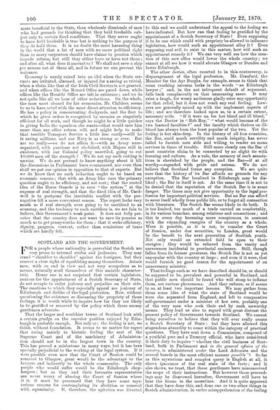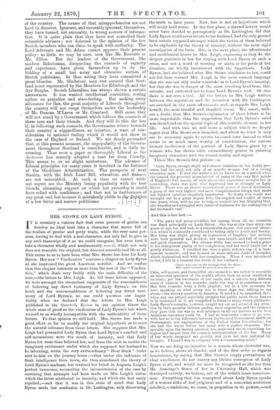SCOTLAND AND THE GOVERNMENT.
FOR a people whose nationality is proverbial the Scotch are very prone to internal strifes and jealousies. They may stand " shoulder to shoulder" against the foreigner, but they reserve a clear right of squabbling among themselves. Astute men, with an end in view and not very scrupulous as to means, naturally avail themselves of this amiable character- istic. Hence one is not surprised that certain legislators, anxious for the appointment of a Scotch Secretary of State, do not scruple to enlist jealousy and prejudice on their side. The emotions to which they especially appeal are jealousy of Edinburgh and dislike of the legal profession. Now, without questioning the existence or discussing the propriety of these feelings, it is worth while to inquire how far they are likely to be gratified or removed by the policy which these uneasy gentlemen advocate.
That the larger and wealthier towns of Scotland look with a certain grudge on the superior position enjoyed by Edin- burgh is probable enough. Not only so ; the feeling is not, we think, without foundation. It seems to us matter for regret that owing mainly to historic feeling the seat of the Supreme Court and of the machinery of Administra- tion should not be in the largest town in the country. This has proved a misfortune in many ways, but it has been specially prejudicial to the working of the legal system. If it were possible even now that the Court of Session could be removed to Glasgow, great would be the advantage to the lawyers and indirectly to the whole community. The only people who would suffer would be the Edinburgh shop- keepers ; but as they and their favourite representative are never weary of abusing the Court of Session where it is, it must be -presumed that they have some mys- terious reasons for contemplating its abolition or removal with equanimity. If, therefore, the agitation was directed to this end we could understand the appeal to the feeling we have indicated. But how can that feeling be gratified by the appointment of a Scotch Secretary of State ? Even supposing it to be one which could with propriety be allowed to influence legislation, how would such an appointment allay it I Even supposing real evil to exist in this matter, how will such an appointment remedy it ? We can very well see how the crea- tion of this new office would lower the whole country ; we cannot at all see how it would elevate Glasgow or Dundee and lower Edinburgh.
The other device, often resorted to in this controversy, is disparagement of the legal profession. Mr. Craufurd, the Member for the Ayr Burghs, for example, seems to think that some crushing sarcasm lurks in the words " an Edinburgh lawyer ;" and, in the not infrequent default of argument, falls back complacently on that unmeaning sneer. It may raise a laugh, for weary audiences gladly seize any opportunity for that relief, but it does not reach any real feeling. Law- yers are generally mixed up with the unpleasant aspects of life ; and are therefore looked upon as, to a certain extent, necessary evils. "If it were na for hot blood and ill blood," says the Doctor in "Rob Roy," what would become of the twa learned faculties ?" and the faculty which thrives on ill- blood has always been the least popular of the two. Yet the feeling is but skin-deep. In the history of all free countries, the Bar, amid much servility and much iniquity, has never failed to furnish men able and willing to render no mean services in times of trouble. Still more clearly can the Bar of most countries claim to be connected by no slight tie with learning and culture. As a rule, the memory of such associa- tions is cherished by the people, and the Bar—if at all worthy—regarded with pride and esteem. We do not believe that Scotland forms any exception. We are quite sure that the history of its Bar affords no grounds for any exception. The Bar localized in Edinburgh may be dis- liked ; the Bar in itself is not. At the same time it is not to be denied that the reputation of the Scotch Bar is in some danger. The times may not give opportunity to the legal pro- fession for important political services. But no Bar can afford to sever itself wholly from public life, or to forget all connection with literature. The Scotch Bar seems likely to do both. It is too limited, too much of a trade carried on comfortably, in its various branches, among relations and connections ; and this is every day becoming more conspicuous, in contrast with the expanding energies of the country as a whole. Were it possible, as it is not, to transfer the Court of Session, under due securities, to London, great would be the benefit to the next generation of Scottish youth. Not only would an extended field be open to their energies ; they would be relieved from the vanity and narrowness incidental to provincial eminence. Still, though fallen from its former greatness, the Scotch Bar is not as yet unpopular with the country at large ; and even if it were, that would furnish no good reason for the appointment of an unnecessary minister.
That feelings such as we have described should be, or should be supposed to be, prevalent and powerful in Scotland, and that public men should be found who will stoop to inflame them, are curious phenomena. And they enforce, as if seems to us, at least two important lessons. We may gather from them some idea of what the state of Scotland would be were she separated from England, and left to comparative self-government under a minister of her own, probably one of the very men who seek their end by such unworthy means. They lead us also to regard with great distrust the present policy of Government towards Scotland. We cannot bring ourselves to believe that they will ever really create a Scotch Secretary of State ; but they have allowed this stupendous absurdity to come within the category of practical questions. They have sent down a Commission, composed of a youthful peer and a Treasury official, who have considered it their duty to inquire " whether the civil business of Scot- land, both in Parliament and in the general affairs of the country, is administered under the Lord Advocate and the several boards in the most efficient manner possible "V So far as this mysterious and complex query is English at all, it shows ignorance of the real state of the facts ; and it also shows, we trust, that these gentlemen have misconceived the scope of their instructions. But however these proceed- ings may be disavowed hereafter, Government will have to bear the blame in the meantime. And it is quite apparent that they have done this, and done one or two other things in Scotch administration, in entire misapprehension of the feeling
of the country. The causes of that misapprehension are not hard to discover. Ignorant, and excusably ignorant, themselves. they have turned, not excusably, to wrong sources of informa- tion. It is quite plain that they have not consulted their ostensible advisers ; nor deferred to the opinion of the few Scotch members who can claim to speak with authority. The Lord Advocate and Mr. Adam cannot approve their present policy ; as little, we may be sure, men like Mr. Bouverie or Mr. Ellice. But the leaders of the Government, like modern Rehoboams, diregarding the counsels of sagacity and experience, have given themselves up to do the bidding of a small but noisy and obtrusive section of Scotch politicians. In thus acting they have committed a great blunder. Mr. Gladstone may rest assured that Scot- land is not represented by the Members for Edinburgh and the Ayr Burghs.. Scotch Liberalism has always shown a certain narrowness. It has wanted intellectual conviction, resting rather on prejudice and class-feeling. But making every allowance for this, the great majority of Liberals throughout the country will not range themselves under the leadership
, of Mr. Duncan M'Laren or Mr. Craufurd. Still more, they will not stand by a Government which follows the counsels of these men and their friends. And they will do this the less if, in following such counsels, the Government evince towards their country a niggardliness, an injustice, a want of con- sideration to national feeling which it would not show in the case of England or Ireland. We are firmly persuaded that, at this present moment, the unpopularity of the Govern- ment throughout Scotland is considerable, and is daily in- creasing. Thus even a paper so thoroughly Liberal as the Scotsman has recently adopted a tone far from friendly. This seems to us no slight misfortune. The advance of Liberal principles for many years is involved in the fortunes of the Gladstone Administration. The prospects of next Session, with the Irish Land Bill, education, and finance, are not untroubled. At such a time we cannot with- out regret see the Ministry losing popularity with its best friends, alienating support on which but yesterday it could have relied with confidence ; and that not in furtherance of any great end, but because it mistakenly yields to the (ligation of a few bitter and narrow politicians.• • • •
• : :• • •



































 Previous page
Previous page